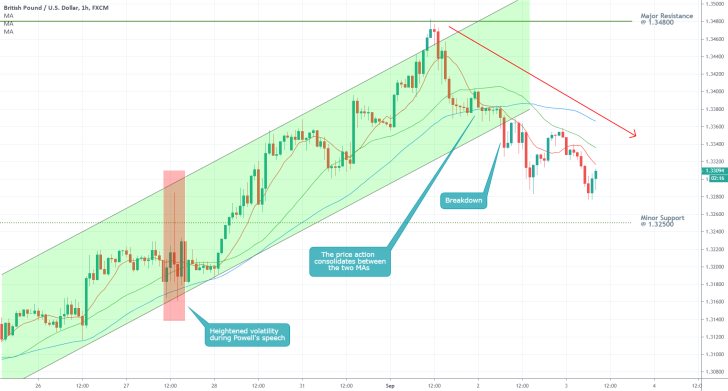
Yesterday, the Deputy Governor of the Bank of England Ben Broadbent discussed 'monetary finance' at the 2020 annual meeting of the Central Bank Research Association.
He tried to defend the BOE's monetary policy stance by discussing in length the hot-button issue of monetary finance by drawing a dividing line between the functions of monetary and fiscal policies.
Chiefly, Broadbent addressed the popular criticism of quantitative easing that central banks use QE to monetise Governments' comprehensive fiscal policies which typically lead to high budget deficits.
BOE's Deputy Governor pointed to the 'cyclical behaviour' of monetary and fiscal policy, stressing on the common conditions that typically necessitate them. A good example of this was the coronavirus crisis this year, which incited governments and central banks to act promptly in order to protect the fragile financial systems.
Broadbent alluded to the fact that simply because the two policies seldom are used simultaneously to tackle common issues, they are not the same thing. MP is used to control inflation, and to ensure that tight FP does not lead to 'wholesale loss of monetary control'.
That is why it is essential that an independent authority administers MP as opposed to FP, which is settled by the government.
"As for the “money” created by QE – reserve deposits held by commercial banks at the central bank – there’s a very important difference between this and the “money” in simple textbook accounts of inflation: those reserves pay interest. If QE had been financed by the zero-interest money of the textbook, and if inflation subsequently went up, the real value of the public sector’s liabilities would decline. […] When reserves pay interest that’s no longer the case. This is why it’s not strictly correct to say that QE “monetises” the government’s debt. The policy is more accurately seen as a maturity swap, in which one (longerterm) interest-bearing liability of the state is replaced with another, shorter-term version of the same."
Broadbent's vindication of QE did not thwart the slide of the pound, which continues to tank against the greenback following Tuesday's publication of the better-than-expected manufacturing data in the US.
As can be seen on the hourly chart below, the GBPUSD broke down below the lower boundary of the ascending channel, which was first demonstrated in our analysis from yesterday.
The price action currently remains concentrated below the three moving averages – the 10-day MA (in red), which trades below the 30-day MA (in green). The latter is also positioned below the 50-day MA (in blue). This perfect descending order demonstrates the promptly rising bearish bias in the short-term.

Trendsharks Premium
Gold is undergoing a correction, as investors take profits to offset losses from falling stock prices, impacting their margins. However, we anticipate a renewed wave of [...]
The Swiss stock market index is mirroring its global counterparts, such as Germany 40 and US100, experiencing a sharp decline following the announcement of new [...]
We’re analyzing the weekly chart to grasp the broader market trend. Over the past three years, the US30 index has surged by 17,000 points, often resembling a nearly straight [...]
Over the past week, the DAX has experienced a sharp decline, plunging by an astonishing 3,400 points. This downward movement is not isolated, as its international counterparts, such as the UK100 and US100, are also facing significant [...]
EURUSD recently formed a double top at 1.0930, signaling a potential trend reversal, and has since begun a correction. After a 600-pip rally since early March, a pullback at this stage is both expected and healthy. Given these conditions, we are placing a [...]
Since early March, EURJPY has surged nearly 1,000 pips, providing us with several excellent trading opportunities. However, as the rally matures, many early buyers are beginning to take profits, leading to a noticeable slowdown in the uptrend. On Friday, the pair formed a [...]
The AUDJPY currency pair continues to be dominated by bullish momentum, as multiple golden cross patterns reaffirm the strength of the ongoing uptrend. Despite this, we are witnessing a much-needed [...]
The EURAUD currency pair appears to be undergoing a trend reversal, signaling a potential shift in market direction. A notable technical development is the formation of a Death Cross on the chart, a widely recognized bearish indicator that typically suggests a [...]
After securing an impressive 200-pip profit last week, the EURJPY currency pair is now undergoing a southward correction, retracing some of its recent gains. Despite this temporary pullback, the Golden Cross remains intact, reinforcing our view that the overall trend continues to be [...]
The appearance of a Golden Cross in Silver strengthens our analysis that the metal is currently in a strong uptrend, indicating further bullish momentum in the market. This technical pattern, where the short-term moving average crosses above the [...]
This trade presents a considerable level of risk and can be classified as an opportunistic move based on recent price action. The GBPUSD currency pair has experienced a substantial bullish rally, surging by nearly 500 pips in a strong upward movement. However, after this extended period of appreciation, the pair is showing signs of a potential [...]
The anticipated Death Cross on the SMI20 appears to be failing as price finds strong support at the 23% Fibonacci retracement level. After testing this area, the index has shown bullish strength, printing several large green candles, signaling an increase in [...]
A Golden Cross has just appeared on the USDJPY chart, signaling a potential bullish move. This technical pattern occurs when the 20 period moving average crosses above the 60 period moving average, a widely recognized indication of increasing [...]
After 2 months of a down trend, we finally see some indications of price recovery for Oil. The golden cross, a historic buy signal, supports this [...]
For the past month, the German DAX40 has experienced a remarkable 10% surge, reflecting strong bullish momentum. Despite ongoing market volatility and frequent pullbacks, every dip continues to attract fresh buyers, reinforcing the [...]
Oil continues its downward trajectory, despite occasional pullbacks. The overall trend remains bearish, reinforced by multiple Death Cross patterns, a classic sell signal indicating further weakness. Adding to this bearish outlook, the critical [...]
Over the past few days, gold has experienced a sharp decline of more than $100. This downturn can be attributed in part to traders securing profits to manage their margins, which are under strain due to the significant drop in major indices. Currently, gold has fallen below the [...]
The NASDAQ 100 index is showing strong bullish momentum, as evidenced by the formation of a Golden Cross on the chart. This classic buy signal occurs when the short moving average crosses above the long term moving average, suggesting that upward momentum is [...]
The EURAUD currency pair has encountered a significant resistance level, failing to break above the critical 61% Fibonacci retracement level. This suggests that bullish momentum is weakening, reinforcing the case for a potential downward move. Given this technical setup, we favor entering a [...]
The UK100 is experiencing a remarkable rally! Over the past few weeks, the British stock market index has surged nearly 800 points. Each minor dip has attracted more buyers, fueling the bullish momentum. However, since last week, we’ve observed a slight [...]




















